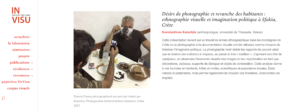Διάλεξη Κωνσταντίνου Καλαντζή στο Εθνικό Ινστιτούτο Ιστορίας της Τέχνης (INHA), σειρά σεμιναρίων «Η Εμπειρία της Εικόνας ΙΙ»
Ιnstitut National Histoire del’ Art, INVISU, 16/1/24,

My presentation reflects on long-term ethnographic fieldwork in highland Crete, where I have used photography and visual culture as a means of theorizing political imagination. In my paper, I will be discussing how photography illuminates questions of power as well as people’s relationship to place, the past and “tradition.” I will also be exploring the problems and potentials of the medium’s role as a catalyst in my own relationship to interlocutors. The paper probes into old problems of Romanticism and Orientalism in the relationship between centers and peripheries and investigates photography’s political possibilities in enabling experiences of conflict, affect, exchange and reciprocity. Situated in the pre and the post-2010 EU/IMF-bailout-program period, marked by suspicion of European guardianship in Greece, the paper unpacks different photographic events focused on images of “traditional” old men. It starts with a consideration of the rawness of this visual economy and continues with photographs that become repoliticized as decorations, gifts, platforms of dialogue and objects of contestation. These events speak to different possibilities of “citizenship” between the parties involved and the subjects they anticipate: tourists and locals; Germans and Greeks; hosts and guests; perpetrators and victims; scientists and natives; nation states of the center and the periphery but also, they allow positionalities that blur these boundaries. These events also sketch varying potentials of photography in reconstructing the past and imagining different kinds of future.
